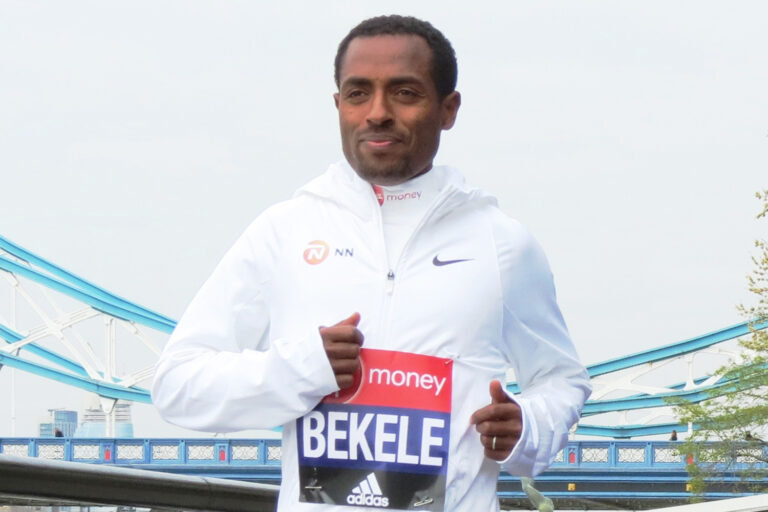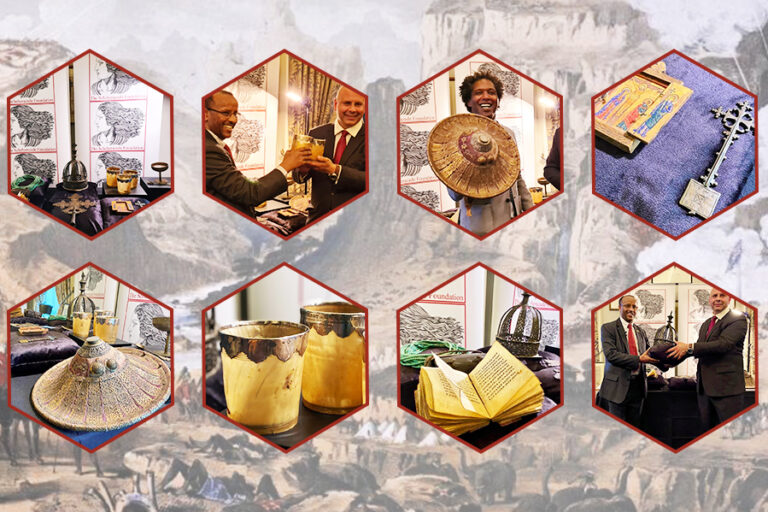Ethiopia gave their 2022 World Cup qualification hopes a major boost with a 1-0 home win over Group G rivals Zimbabwe at the Bahir Dar Stadium on Tuesday afternoon.
The result – secured by an injury-time penalty from Aschalew Tamene – sees the Walia Ibex join Ghana on three points, tied for second place, with South Africa leading on four points and the Warriors propping up the log with one point.
Ethiopia were the more forceful and proactive team through the first half, with attackers Amanuel Gebremichael, Abubeker Ahmed and Getaneh Kebede combining to force Zimbabwe onto the back foot for most of the first 45 minutes.
Yet the Walia Ibex struggled to create scoring opportunities, only once calling Warriors goalkeeper Talbert Shumba into serious action, as he kept out a drive from Kebede midway through the opening stanza.
The visitors provided a sporadic threat and saw Khama Billiat shoot on target just past the half-hour mark, though goalkeeper Fasil Gebremichael was able to make a relatively comfortable save.
Ethiopia’s rhythm was disrupted somewhat when they were forced into a 33rd minute change, replacing the injured Shimeles Bekele with Tafesse Solomon, and the half closed with the score locked at 0-0.
The East African side picked up in the second half where they left off in the first, though they found Zimbabwe’s defence difficult to break down – and when they did manage to get off efforts, Shumba was on hand to deny the hosts.
Ethiopia looked set to be frustrated right to the final whistle, but their pressure paid dividends in injury time at the end of the game, as they earned a penalty call from referee Bernard Camille and Aschalew Tamene converted from the spot to secure a 1-0 victory.
Ethiopia will return to Group G action with back-to-back matches against South Africa in October, while Zimbabwe will face Ghana both home and away.
Before the match the Zimbabwe Football Association (ZIFA) said that the Warriors will receive a massive bonus if they manage to beat Ethiopia in their second 2022 World Cup Qualifying Group G encounter.
In an effort to motivate the players ahead of the match, the local football mother body revealed that its fundraising committee has secured a US$ 64,000 cash bonus to be shared amongst the players and technical team members.
Ethiopia snatch late winner to revive 2022 hopes
Kenenisa Bekele leads powerful Ethiopian charge in Berlin
The BMW Berlin-Marathon will get underway on Sunday, September 26 with high-quality elite fields headed by the Ethiopian superstar Kenenisa Bekele on his fourth appearance in Germany’s biggest and most spectacular marathon, while his compatriot Hiwot Gebrekidan will run in Berlin’s women’s field for the first time. Gebrekidan is currently the fastest female marathon runner in the world this year.
Kenenisa Bekele is 39 now and will be running the BMW BERLIN-MARATHON for the fourth time. He won the race in 2016 but dropped out the next year and returned in 2019 to triumph once again. In both victories the Ethiopian missed the then world record by a matter of seconds.
Ethiopia’s superstar will face two strong compatriots among his rivals. Guye Adola made an outstanding marathon debut in 2017 beside the River Spree with second place in 2:03:46. His time was record for a marathon debutant and Adola even put the eventual winner, Eliud Kipchoge, under pressure, leading the great Kenyan until shortly before 40 kilometres. Another Ethiopian who surprised many on his marathon debut is Olika Adugna. He will be running in Berlin on September 26 with a best of 2:06:15 from winning debut in Dubai in 2020.
The women’s field includes the fastest marathoner in the world this year, Ethiopia’s Hiwot Gebrekidan, who won the Milan Marathon in a personal best of 2:19:35 in April. Purity Rionoripo of Kenya (pb 2:20:39) and the Ethiopian Shure Demise (pb 2:20:59) should also be relied upon to offer strong challenges.
The Economics of E-Commerce
Recent socioeconomic progress in Africa has occurred in the context of ubiquitous information and communications technologies (ICTs). According to the International Telecommunication Union 2017 data, 67 percent of African population, estimated to be about 1.13 billion, now has mobile phones and 26.5 percent are now using the Internet. Policymakers and African development partners foresee a lot of possibilities in the opportunities made available by ICTs in the continent’s effort to stem widespread poverty and in the role of small and medium-sized enterprises (SMEs) in that effort. In this context, over the last decade, African countries placed high priority on the development and implementation of national ICT policies and plans.
According to the United Nations Conference on Trade and Development (UNCTAD), SMEs account for 60 to 70 per cent of all employment in developing countries, and hence contribute to poverty reduction. In this regard, many countries in Africa have given high priority to the growth of SMEs. Kenya, for instance, released a major strategic plan, known as Vision 2030, in which ICTs and SMEs have been identified as major driving forces for its realisation. Similarly, Ethiopia, in its Growth and Transformation Plan has given top priority to micro and small enterprises, targeting to create employment opportunities for more than three million people and aiming to boost access to ICTs.
In recent years, the role of SMEs in economic development has grown in importance in Africa as the continent’s economic transformation gained momentum. Many countries are directing their strategic development towards industrialization through the growth of the local SME sector. The importance of SMEs in development and poverty reduction cannot be over emphasised.
According to UNCTAD recent data, these enterprises represent 99 per cent of all firms in developing countries, as well as play a significant role in creating employment opportunities. Another key factor supporting the need to focus on SMEs is that they tend to adapt more easily to technology compared to large enterprises. The adaption process in large enterprises is often slowed by a bureaucracy and a stricter hierarchy involved in making decisions. When SMEs are able to see the added benefits of using ICTs, they are more willing to adapt their businesses strategies.
The results of two e-commerce readiness assessments carried out in the Gambia and in Ethiopia under the Economic Commission of Africa (ECA) strengthen this proposition. Both studies suggest that there is general awareness of the potential in using the Internet for commerce among SMEs. Furthermore, due to widespread coverage and use of mobile phones, mobile commerce now provides more opportunities for SMEs, especially in rural areas.
For example, a study found that after remote communities in Uganda were provided with access to a mobile network, the share of bananas sold rose from 50 to 69 per cent of the crop. Established by TradeNet, Esoko, a company in Ghana, provides a mobile and web-enabled repository of current market prices and a platform to enable buyers and sellers to make offers and connect to one another. The World Bank report revealed that in this regard, a recent study of farmers with small landholdings in northern Ghana found that farmers had experienced a 10 per cent increase in revenue after they began receiving market prices from Esoko in the form of a short message service (SMS).
Goldman Sachs reported that globally, e-commerce sales are growing more than 19 per cent a year. Compared to large enterprises, SMEs have a low share of the global e-commerce market, however, they are increasingly adapting to the growing technological revolution and benefiting from the global online market.
E-commerce involves the sale or purchase of goods and services by businesses (business to business), individuals (business to consumer), governments (business to government) or other organizations, and is conducted over computer networks. It builds on traditional commerce by adding the flexibility and speed offered by electronic communications. This can facilitate efforts to enhance operations that lead to substantial cost savings, as well as increased competitiveness and efficiency through the redesign of traditional business methods.
Different studies indicated that both SMEs and large businesses have benefited from the adoption of e-commerce. Such benefits, inter alia, includes lower transaction costs; reduction in advertising and promotion costs; rapid communication between buyers and sellers; ability to reach new customers; shortening the traditional supply chains, including minimising transport obstacles and reducing delivery costs; and eliminating physical limitation of time and space. Empirical research shows that small enterprises that adopt e-commerce perform better than those that do not adopt it due to e-commerce’s catalytic effect on business performances.
There are several explanations for the slow diffusion of e-commerce in developing countries, in general, and in Africa, in particular. Economic Commission of Africa (ECA)-supported e-commerce readiness studies conducted in Ethiopia and in the Gambia, as well as other studies undertaken across the continent, broadly identify similar challenges pertaining to growth of e-commerce in Africa.
Affordable ICT infrastructure, particularly the Internet and broadband, is one of the key factors affecting the growth of e-commerce. Digital literacy among consumers and businesses in terms of computer literacy, language barriers, awareness of e-commerce benefits, lack of confidence and security in online transactions, including lack of a skilled workforce in e-commerce enterprises, are common in many countries. Limited delivery and distribution networks (physical transportation), in both Ethiopia and the Gambia, and the absence of proper street addressing and naming were raised as areas of concern in delivery.
Systems related to electronic payment, branding/recognition, and the issue of tracking, monitoring and taxation systems are also some of the challenges that affect the online transaction process. Legal frameworks to build security and trust are common issues that both consumers and businesses find difficult in adapting e-commerce as their business strategic tool. Ensuring legal and regulatory environments are critical for the complete functioning of e-commerce in a country.
Many SMEs have benefited from ICTs in their day-to-day business activities, including experiencing gains in enhanced productivity. However, due to lack and cost of access to Internet connectivity, many SMEs are not always tapping the full potential of the Internet. Furthermore, high-quality and reliable e-commerce requires advanced telecom services, such as broadband and mobile broadband services, at affordable prices to consumers.
Thus, governments and other partners need to take advantage of the opportunities that are emerging in the use of the new ICT landscape, particularly in innovations in mobile applications. Governments need to ensure that SMEs benefit not only from being connected to the Internet but also from any technological evolution that can increase the speed of data flows and can help reduce costs to consumers. Furthermore, much of the support to e-commerce depends on putting in place the right infrastructure, regulations and policies for e-commerce to thrive. In this regard, the role of government and the private sector is of paramount importance in realising this. Finally, a critical mass of workers with ICT skills is crucial for the further development of e-commerce and mobile applications. In this regard, governments can play an important role in ensuring that the education systems provide training of the necessary skills for building a viable digital economy.
Looted Ethiopian artefacts during battle of Maqdala to be returned home
Ethiopian artifacts looted during the Battle of Maqdala in 1868 are to be returned to Ethiopia, Ministry of Foreign Affairs revealed.
Ministry of Foreign Affairs, in a press release, stated that the looted Ethiopian artifacts to be returned Ethiopia thanks to The Scheherazade Foundation, who purchased the items through a UK-based auction house and private dealers.
Speaking on the occasion at a reception held at The Athenaeum Club, Ethiopian Ambassador to UK, Teferi Melesse thanked The Scheherazade Foundation for their work in acquiring the precious items and renewed calls for museums, collectors and holders of Maqdala 1868 heritages to return them to Ethiopia.
The Scheherazade Foundation CEO, Tahir Shah said he knew what the return of the objects would mean to Ethiopians. He added that he hopes to build bridges between the two nations through his Foundation.
Alula Pankhurst who is an Ethiopian scholar and social development consultant in his social media account said that the return of the treasures is significant. “The treasure trove of returned looted artefacts by the Scheherazade Foundation to the Ethiopian Ambassador in London at a ceremony at the Athenaeum club in London is the single most significant heritage restitution to Ethiopia both in the number and diversity of the items. These include not just beautiful and symbolic religious artefacts including two crosses, an archbishop’s crown, an icon, psalms of King David and magic scroll, but also a magnificent shield, three unusually large horn beakers, as well as copies and illustrations of letters and publications contextualizing the Magdala expedition of 1868,” he said.
“We are on the cusp of a ‘restitution age’, where the role of museum as custodians of colonial heritage is being questioned and global relations and history of artefacts are being reinterpreted with the potential to bridge cultures and strengthen relations between institutions, scholars and the public at large across nations – nowhere more so than in the case of Ethiopia and Britain with a long shared history, notably during the last Emperor Haile Sellassie’s exile as a refugee in Bath and the role of British troops in Ethiopia’s liberation from the Fascist Italian occupation,” he continued.
“The British state rightfully returned several artefacts including the manuscript of the Glory of the Kings in the late 19th Century at the request of Emperor Yohannes IV, and a crown during the reign of Empress Zewditu to the Regent Taferi on his visit for King George VI’s coronation in 1937, and Emperor Tewodros’ seal and a crown during Queen Elizabeth Visit to the Ethiopia in 1965. In the late 20th Century and early 21st Century individual descendants of soldiers of Napier’s Magdala expedition did the right thing and returned more than 20 artefacts as gestures of popular goodwill taking up the call of AFROMET, the Association for the Return of the Magdala Ethiopian Treasures, and recently the Imperial War Museum returned a lock of Emperor Tewodros’ hair.”
Alula further said that “the cache of returned artefacts in one go is almost equivalent to all the private collection returns over many years in the late 20th and early 21st century, and may pave the way for further restitutions initiatives; especially at a time when retaining artefacts, notably human remains such as those of Prince Alemayehu in Windsor Chapel or sacred objects such as a the holy Tabot Arks of the Covenant in the British Museum, that it has been agreed never to display is becoming increasingly anachronistic, irrelevant and embarrassing. In stark contrast these and other artefacts have immense historical, cultural and spiritual value in the homeland to which they belong and their return results in jubilation and national pride and immense gratitude that a historical wrong has at last been rectified. It is high time that Britain follows the example of the British people and the most recent trail blazing initiative of the Scheherazade foundation ‘Buying Back Better’ and participating in the growing movement for heritage restitution and building global and bilateral cultural bridges and promoting increase mutual respect, understanding and collaboration.”






